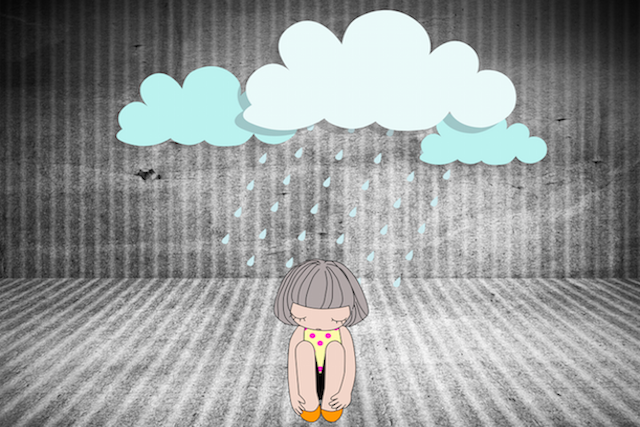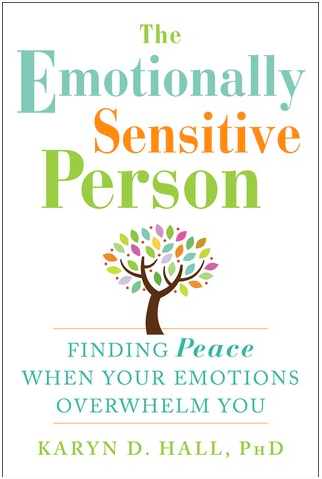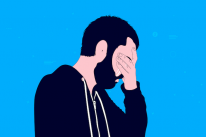
Update: The winners for this giveaway have been chosen:
You’re too sensitive. You’re making a big deal out of nothing. Why are you letting that bother you? Why can’t you just let it go? Really, you’re crying? What’s wrong with you?
If you’re an emotionally sensitive person, like me, you may have heard some of these phrases throughout your life. And, like me, you may have concluded that your emotions made you tragically flawed.
For the longest time, I felt a deep sense of shame about my sensitivity. And I found it difficult to deal with everyday life—not just because I felt everything so deeply and often reacted irrationally, but also because I absorbed other people’s feelings as if they were my own.
I remember in elementary school when most of my peers had to get shots from the school nurse. I’d already gotten one at my pediatrician’s office, so I sat in the hallway as, one by one, they approached her office to meet certain doom.
I could recall the fear and dread I’d felt in the moments before the needle pierced my skin, and I relived it, over and over again, as each student approached the door. In fact, my vicarious anxiety was so intense that I threw up, right there in the hallway.
I didn’t just empathize with their pain—I felt it. Deeply. And repeatedly.
I constantly felt emotionally overwhelmed, and often confused about the root of my feelings. All I knew was that I hurt—a lot—and I wanted to make it stop.
When I first realized I wasn’t alone with my emotional sensitivity, it was like someone rubbed a soothing balm on the achy heart I wore on my sleeve.
And it was even more liberating to realize I could leverage my sensitivity for good, as I have through Tiny Buddha.
Suddenly, it wasn’t something I had to hide; it was something I could openly acknowledge and harness in a positive way.
Still, I’ve had to work at managing my emotions, and I’ve had to learn to challenge destructive thoughts and behaviors that only exacerbate my pain.
If you too experience intense emotions, you don’t need to feel bad about yourself, or powerless to your heightened sensitivity.
Psychologist Karyn D. Hall has written a life-changing book that can help you manage your emotions so they don’t take over your life.
The Emotionally Sensitive Person: Finding Peace When Your Emotions Overwhelm You offers proven strategies to identify emotional triggers, challenge negative thought patterns, and recover from emotions more quickly.
I wish I’d read this book years ago. It’s insightful, practical, and chock-full of effective strategies to transform your sensitivity from a burden to a gift.
I’m grateful that Karyn took the time to provide some incredibly detailed answers to my questions about emotional sensitivity, and that she’s provided two free copies of The Emotionally Sensitive Person for Tiny Buddha readers.
 The Giveaway
The Giveaway
To enter to win one of two free copies of The Emotionally Sensitive Person:
- Leave a comment below
- For an extra entry, tweet: Enter the @tinybuddha giveaway to win a copy of The Emotionally Sensitive Person http://bit.ly/1KZGNnL
You can enter until midnight PST on Friday, May 22nd.
The Interview
1. Tell us a little bit about yourself and what inspired you to write this book.
I’m a therapist who works with emotionally sensitive people and I’m an emotionally sensitive person too.
I noticed that many people were suffering because they felt different, rejected, and flawed because of their emotional sensitivity. Many of them had heard statements like, “You’re just overreacting,” and “Stop being so dramatic,” for most of their lives.
In my work I found that if emotionally sensitive people could understand and accept their sensitivity, and not judge themselves because of it, that could ease some of the suffering they experience. I also believe that learning to manage intense emotions is part of decreasing their suffering.
Being emotionally sensitive is not an illness, but it does mean you are more vulnerable to anxiety and depression and other disorders. Judging and hating yourself for being sensitive is part of the pain and suffering that happens.
I wanted to write a book that could help emotionally sensitive people accept their sensitivity and learn to manage their intense emotions to help them live the life they want to live.
2. What causes emotional sensitivity?
Emotional sensitivity is biological. Research shows that some individuals are born with more intense emotions, meaning you react faster to emotional situations, your emotions are more intense, and your emotions take longer to fade. Events in a person’s life could also influence that emotional sensitivity.
3. Emotionally sensitive people, like myself, often feel shame for being this way. What can help people like me feel less ashamed, more accepting, and perhaps even proud of their emotional sensitivity?
First of all, ask yourself if the shame you experience is based on facts. All emotions have a purpose, and the role of shame is to keep you from behaving in ways that would get you kicked out of groups that are critical to your survival.
Most likely being an emotionally sensitive adult will not get you kicked out of important groups. Is the shame from being judged by others as flawed? Perhaps as a child? Maybe from people who didn’t understand? Perhaps give some thought as to what specifically the shame is about and how it came to be.
So if shame is not justified, that being emotionally sensitive is not something that warrants shame, then consider that the way to overcome shame is to do the opposite behavior to that which shame urges you to do.
Shame urges you to hide. So the opposite behavior is to not hide. To do the opposite is to look people in the eye, and stand up proud of your sensitivity. When people say, “You’re overreacting,” respond with pride, “Actually, this is exactly how I feel—I feel emotions intensely.”
Many times it is the discomfort that other people have with emotions that leads them to criticize your emotional reactions.
Our culture tends to value logical, analytical thinking. That doesn’t make their way better. In fact, emotionally sensitive people are the ones who become passionate about causes and make changes in the world. They are artists and caregivers and those who contribute to humanity.
The positives of being emotionally sensitive are often overlooked. If you consider it very carefully, what could or are you proud of about your emotional sensitivity? Make a list and review it often. Keep the positives in your mind to help you keep a balanced view of your emotional sensitivity.
Let yourself really see what your sensitivity is about—check out reality and let go of myths you might have accepted along the way about the “wrongness” of emotional sensitivity. Do you care intensely about others? Do you express yourself authentically?
Another idea is to practice self-compassion in place of judging yourself. Respond to yourself as you would a friend who feels emotions strongly.
If your emotional sensitivity leads to depression or anxiety or to behaviors that you know are not effective or helpful, then focus on changing the behaviors and learning ways to manage your emotional sensitivity that work for you rather than judging your sensitivity.
It’s not wrong, it’s just different. Judging your sensitivity is like judging yourself for how short or tall you are. It just is. It’s not helpful to continually berate yourself for your height, and in the same way seeing your sensitivity as wrong or yourself as flawed only adds to your distress and suffering.
4. What are the two different types of emotional sensitivity, and how do they manifest?
The two types I’ve identified are reactive and avoidant. People who are reactive act on feelings without thinking and are very quick to respond to emotional triggers. They have strong impulses that come with their emotions. They can be spontaneous and fun and also may act in ways that cause difficulties for themselves.
The avoidant type attempts to push away or avoid uncomfortable emotions and/or situations. The avoidant type might not attend gatherings if someone at the event was upset with her and would avoid other situations that might involve difficult feelings, such as confronting someone who owed her money or saying no to someone who asked for a favor.
5. What are some things we can do to improve our ability to manage our emotions?
There are many options to improve your ability to manage your emotions. One area is prevention.
This means that you make sure that you get sufficient sleep, eat a nutritious diet, take prescribed medications, take care of your physical health, exercise, and create positive experiences to build your resiliency. Work to develop safe and emotionally intimate relationships so you have a support network.
Let go of judging, stop avoiding your emotions, learn ways to change your emotions, and stop feeding or building difficult emotions. The book discusses the specifics of these ideas. In addition, I have a subscription website opening soon called DBTCoaching.com that focuses on coping skills.
6. You wrote that emotionally sensitive people tend to “catch” other people’s emotions. Can you tell us a little about this, and how we can stop doing it?
Emotionally sensitive people are often tuned in to the emotional experiences of other people, so much so that they may experience the emotion that someone else is having. If you are with someone who is sad, you may feel sadness too, for example.
Awareness that you are experiencing an emotion that actually belongs to someone else is helpful in letting go of it.
If someone is relating an experience that made them sad, then you can say to yourself, “Not my experience, her experience,” to help maintain the boundary.
If you experience emotions that you imagine others might have, such as “She must be so sad,” then remind yourself that someone else’s experience is not necessarily the same as yours. For example, if someone is moving, he might be excited and happy instead of sad or scared or vice versa.
7. In reading the “Identifying Your Emotions” section of the book, I realized I’ve mislabeled many thoughts as feelings, compromising my ability to cope with my actual emotions effectively. Can you share a few examples of mislabeling thoughts as feelings, and how we can identify what we really feel?
Some examples of mislabeling thoughts as feelings can be as simple as, “I feel like I’ll never succeed,” “I feel like I don’t fit in anywhere,” and “I feel like I’m different from anyone else.”
Those expressions are actually thoughts. To be more accurate your would say, “I think I don’t fit in anywhere and that makes me sad,” and “I think I’m different from anyone else and that makes me sad.” Then you either challenge the thoughts or find ways to cope with the feelings that come with the thought.
It’s difficult to challenge statements when you express them as feelings. “I am scared because I think I’ll never succeed” gives you the information about both the feeling you are having and the thought.
You recognize that as a negative thought and you can challenge it. Is that statement true? In what situation do you think it is true? Do the facts back it up? If so, what do you need to do differently? The emotion of sadness would indicate coping skills to help you deal with that specific emotion.
8. In Chapter 6, you wrote, “Judgments hide primary feelings.” What did you mean by this—and how can we challenge our judgments?
We often judge when we are emotionally upset. “He is a complete jerk,” is a judgment. What led to that thought and emotion? Maybe you were embarrassed because you spilled wine all over yourself and your date didn’t offer to help clean up. You use the judgment of him to cover the embarrassment.
“I spilled wine all over myself and I felt hurt that he didn’t help me clean it up,” might be more accurate.
9. The chapter that was most helpful to me personally was the one on decision-making—particularly the part about separating the decision from the emotion and accepting emotional consequences. Can you expand on this?
I’ve found that many emotionally sensitive people believe they can’t make decisions but they actually avoid decisions because of the emotional consequences of those decisions.
There are few choices that don’t have emotional consequences. Even picking a restaurant for a group dinner means someone will likely not agree with the choice and may be disappointed or critical. You know which restaurant you want, but you struggle with the decision because of the emotional consequences of the decision. You don’t want anyone upset.
If you can separate the two, the choice of restaurant and the emotional consequences of the choice, then you can be clear about what the issue is and how you want to manage it.
10. What do you think is the most important thing an emotionally sensitive person can do for their well-being?
Accept themselves as they are, completely and totally, and also work on changing behaviors that are keeping them from being effective in building the life they want to live.
You can find The Emotionally Sensitive Person on Amazon here.
FTC Disclosure: I receive complimentary books for reviews and interviews on tinybuddha.com, but I am not compensated for writing or obligated to write anything specific. I am an Amazon affiliate, meaning I earn a percentage of all books purchased through the links I provide on this site.
Girl under rain clouds image via Shutterstock
About Lori Deschene
Lori Deschene is the founder of Tiny Buddha. She started the site after struggling with depression, bulimia, c-PTSD, and toxic shame so she could recycle her former pain into something useful and inspire others to do the same. You can find her books, including Tiny Buddha’s Gratitude Journal and Tiny Buddha’s Worry Journal, here and learn more about her eCourse, Recreate Your Life Story, if you’re ready to transform your life and become the person you want to be.
- Web |
- More Posts













 Though I run this site, it is not mine. It's ours. It's not about me. It's about us. Your stories and your wisdom are just as meaningful as mine.
Though I run this site, it is not mine. It's ours. It's not about me. It's about us. Your stories and your wisdom are just as meaningful as mine. 